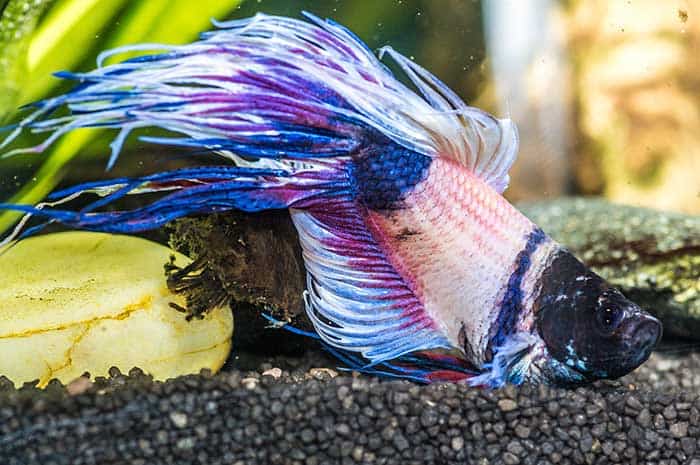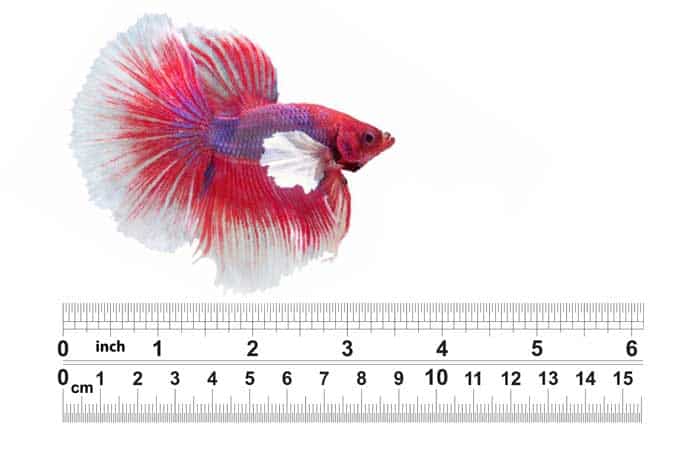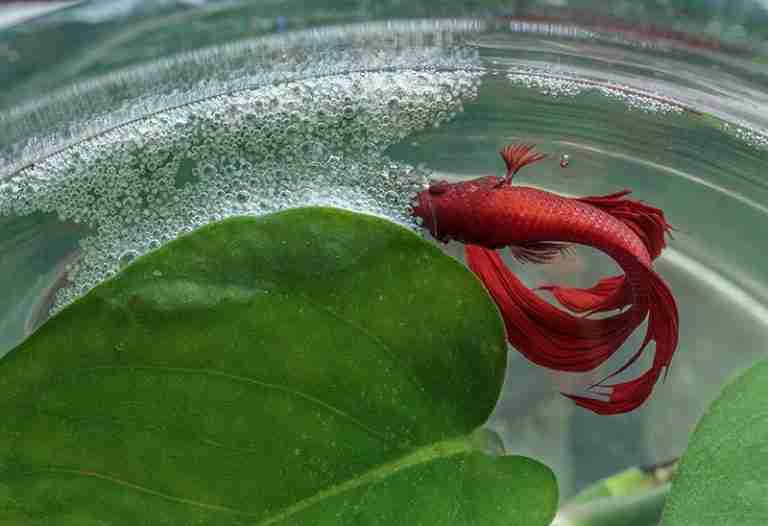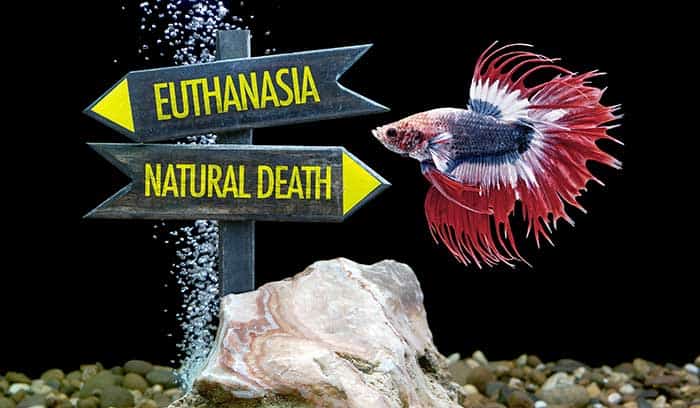Baby Betta Fish Care (And Feeding Guide)
Whether you have just found that you are a parent to a new fry of baby betta fish or are just considering breeding them, it is always best to do your research and determine what you will need to expect when caring for baby bettas.
This article covers everything you need to know about baby betta fish care to make your experience as straightforward as possible.
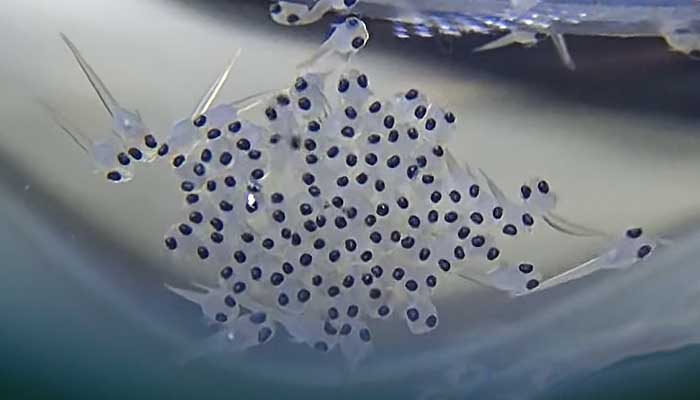
Baby Betta Fish Care
Baby bettas are not overly challenging to care for, but like any child, they have specific needs. Below are some of the things that you will need to know:
1. You should remove betta fry from their parents.
2. Feed your betta babies various foods, from crumbled pellets to small live foods.
3. Tank temperature should be consistent, and between 78° to 80° Fahrenheit (25.5° – 26.7° Celsius), so a good aquarium heater is essential. It is always wise to keep a spare aquarium heater in case of malfunction.
4. Baby bettas need frequent water changes. Clean water should be treated appropriately to remove harmful chemicals.
5. Use a sponge filter to stop your baby betta from getting sucked inside the filter. Also, the filter flow rate should be low.
I discuss each of the points above in a little more detail throughout this short article and cover a few other essential aspects of caring for baby betta fish.
How Many Babies Do Betta Fish Have
Betta fish (Betta Splendens) are not actually livebearers. Instead, betta fish lay eggs that are fertilized by the male betta and placed inside the bubble nest he has built to protect them until they hatch.
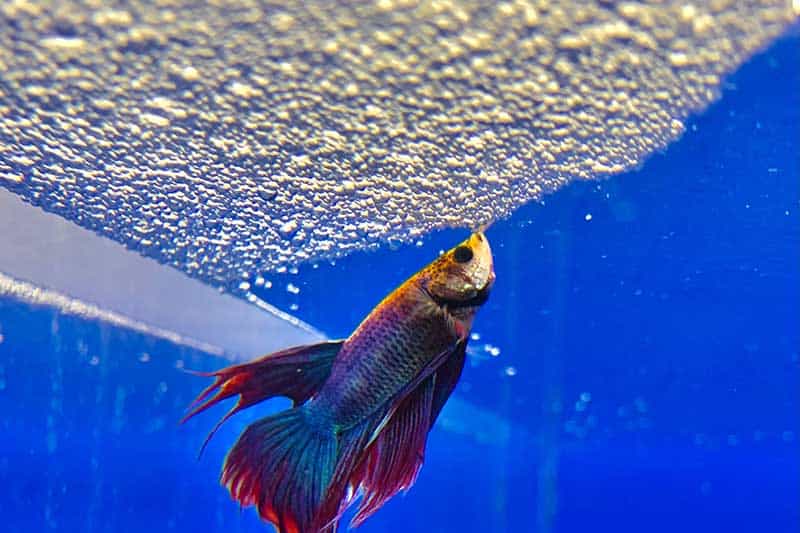
The male betta usually tends to the nest, taking care of and protecting the eggs until the baby betta fry is born.
How Many Eggs Do Betta Fish Lay
Betta fish will typically lay around 40-50 eggs each spawning. Although the female betta can lay up to approximately 500 eggs in one go, this is not common.
The male will wrap his body around the female betta during mating, squeezing her until she releases her eggs. As the eggs are released, she will escape his grip and go about her business while he fertilizes the eggs by releasing sperm over them.
The process of lay and fertilization is a speedy one, usually taking only a few minutes, sometimes quicker, which is why adult bettas spawn so often. The process can also occur several times in one mating until the female is empty of eggs.
How Long Do Betta Eggs Take To Hatch
Betta eggs can take roughly 3 to 4 days to hatch, but this depends on the surrounding temperature, the health of the eggs, and general tank conditions.
It is vital that once the eggs have been laid, they are left undisturbed until they have hatched. The male betta fish will guard the eggs ferociously, and any interference with them could result in him abandoning the nest.
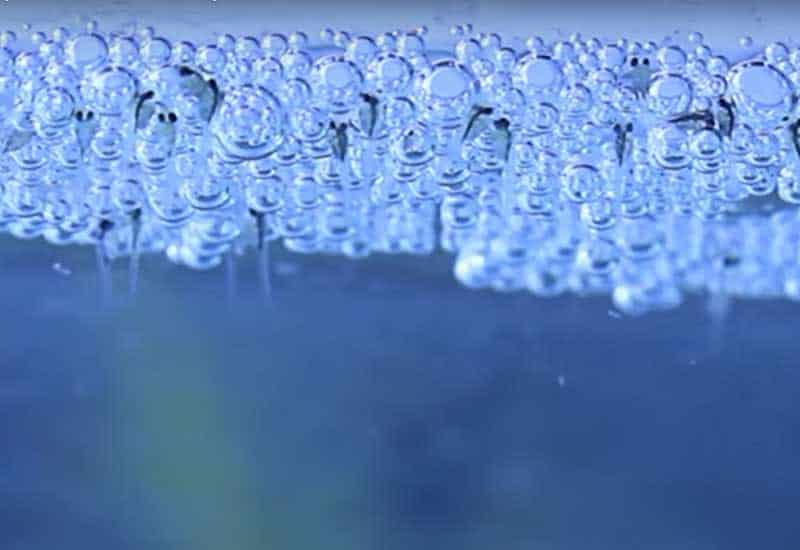
Removing the female betta from the tank is also essential, as she may eat the eggs. Once mating has finished, the male will view the female as a threat to the nest and may become aggressive toward her while protecting the eggs.
When To Remove Male Betta From Fry
Once the betta eggs have hatched, you will see their tails hanging down from the nest, but at this stage, the babies are not ready for free swimming and are still very vulnerable.
Any babies that fall from the nest will be collected by the adult male and placed back in the nest until they develop a horizontal swimming position.
The adult male betta usually does a wonderful job protecting the bubble nest, eggs, and newly hatched fry, often not eating until they can swim freely.
Should you notice the male eating any of the eggs, which can sometimes happen, he will need to be removed, however, you need to be sure he is eating the eggs and not just placing them back in the nest.
When the newly hatched infants are in their free-swimming stage at around 2-4 days after birth, the betta male can and should be removed. Alternatively, the young bettas can be moved into a tank by themselves.
Moving the male betta will allow him to feed and recuperate, stopping him from eating any of the baby bettas.
Do Betta Fish Eat Their Babies
Female betta fish are more likely to eat their babies than males because of the heightened aggression and stress levels caused by pheromones. Males release fewer pheromones, making them less likely to attack their young.
If the mother appears to be eating her fry, she probably is. Male betta fish dads will become protective towards the eggs and the hatched baby betta fish, usually becoming aggressive toward the mother if she appears to be a threat.
Male betta fish will sometimes eat newly hatched betta babies, the reason for this is unclear, especially when he has been so protective of the nest. Still, one suggestion is that the male removes any malformed betta babies from the group.
Can Baby Bettas Live Together
Baby betta fish can live together peacefully for 3 to 6 months before becoming territorial and showing aggression toward each other.
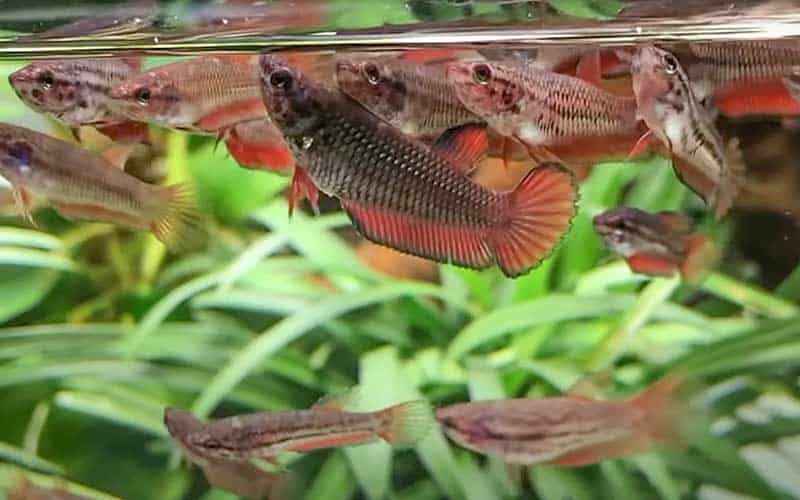
Baby betta fish that do try to fight can do little harm as their teeth are not adequately developed, and they lack the size and strength required to carry out the kind of aggression seen in adult betta fish.
Female bettas can often live together quite peacefully in the right conditions and are referred to as a betta sorority.
Do Baby Betta Fish Fight
Once your baby fish are approaching 3-6 months old, you may begin to see some aggression, and a pecking order will begin to form within the tank. You will need to separate the males at this stage to avoid fighting.
Aggression seen at this point will be caused by them becoming teenagers, where they will be ready to mate and fight for their own territory within the aquarium.
Betta fish start to reach sexual maturity from around 4 months old, and they will reach their peak at approximately 10-14 months of age.
Although females are much less aggressive and are more likely to get along in the same tank, especially with sisters, some fighting can also occur. The aggressive females will also need to be removed and put in a separate tank when it does.
How Fast Do Baby Betta Fish Grow
Baby betta fish grow pretty quickly, considering they can measure as little as 0.8mm at birth and grow to around 5cm within 11-12 weeks.
A Betta fish’s body will reach its full size at around 6-7 months old, although its fins will continue to grow for several months beyond this time. Male betta fish have longer fins than females, so they will take longer to develop.
Young bettas should also display adult coloration from this point on if they have been fed correctly and kept in well-oxygenated, good-quality water.
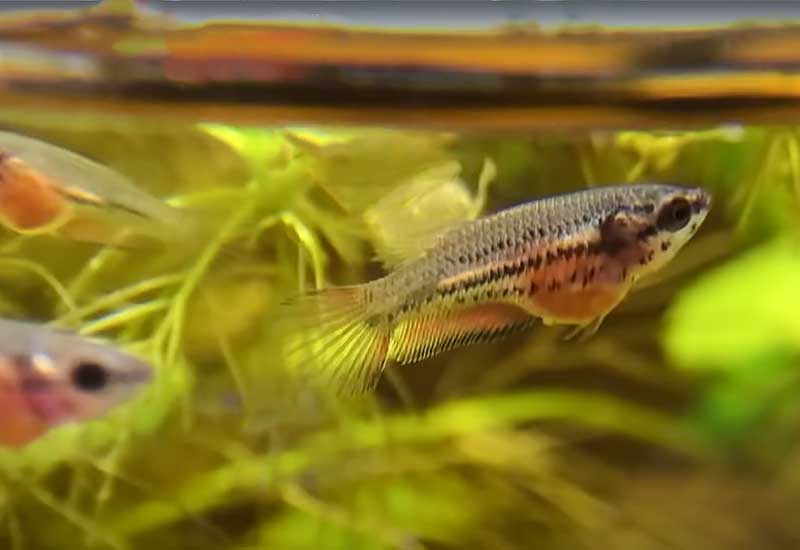
Suppose the environment they are kept in has low oxygen levels and poor water conditions, or the betta is not receiving a varied diet of quality betta fish food. In that case, growth rates will slow, and the coloration may also be pale and washed out. Betta water should be tested regularly and kept clean at all times.
Betta Fish Growth Chart
The chart below will give you a quick reference guide to the average growth rates and sizes of female and male betta fish throughout their main growth stages.
| Betta Age | Approximate Size |
|---|---|
| Birth | 0.03 inch (0.76mm) |
| 1-2 weeks old | 0.2 inch – 0.25 inch (5.08mm – 6.35mm) |
| 3-5 weeks old | 0.35 inch – 0.6 inch (8.9mm – 15.25mm) |
| 6-8 weeks old | 0.85 inch -1.3 inch (21.6mm – 33mm) |
| 9-12 weeks old | 1.55 inch – 2.1 inch (39.4mm – 53.3mm) |
The figures above have been collated to calculate these averages from several sources, including betta owners, breeders, and online sources. It is important to understand that sizes can vary significantly from one betta to another.
A bettas body can be fully grown long before the fins are fully developed, with some species fins making up two-thirds of its overall length.
The largest growth takes place between birth and 5 weeks old.
Betta Fry Growth Stages
There are several growth stages for a baby betta to go through until they are fully grown, so let’s look at what they are.
| Betta Age | Main Growth Characteristics |
|---|---|
| Birth to 1 week | New born betta babies stay near the top of the tank, are very transparent, and lack fins. At around 1 week, betta fry begins to change. |
| 1-2 weeks | Tail growth and dorsal fin beginning to form. |
| 3-5 weeks | Growth spurt, the body has almost doubled in size, and some coloring is showing. |
| 6-8 weeks | Color is more defined and further fin growth. |
| 9-12 weeks | – Female fins are usually fully grown. – Male fins continue to grow. – Become sexually active. Males should be removed from the tank and placed in separate tanks before aggression shows. |
| 13-16 weeks | Color continues to develop in some males with further fin growth. |
| 17-20 weeks | Males should be close to fully developed fins depending on the variety. Longer finned betta can take 6-10 months for full development. |
Do Baby Bettas Change Color
Baby betta fish will change color from around 4-6 months of age. Pet store bettas are usually at least 6 months old as they are not fully developed in color or fin growth until this age.
Male bettas often won’t be sold until 9-12 months of age, as their stronger colors and plumage take longer to develop.
Female bettas will not usually have as much coloration as male betta fish, which can help tell them apart from the more aggressive males.
How Long Do Bettas Live
On average, betta fish will live for around 3 years, give or take a year. There are some reports of betta fish living up to 8 years, but this will be pretty rare.
Wild betta fish often live much shorter lives than in captivity, as their aggressive nature usually results in fights that cause devastating injuries.
These injuries can directly result in death, an infection brought on by the injuries, or even stress-induced disease.
Baby Betta Care
Baby betta care is very similar to adult betta care, with just a few adjustments to make over the first month or so of their life. Your new babies will grow faster than you can, say Jack Robinson, and as teenagers, they will require the same care you would provide to adult betta fish.
I have already talked about removing the babies from their parents, which is a critical way to ensure the survival of the betta fry.
The first few weeks are the most challenging fry stage until these young fish grow to a healthy size. The first few days are when you should expect to lose some baby fish, often through birth and genetic defects or because they are not strong enough to feed.
The survival rate for betta fry is around 85-95 percent which is pretty high, so let’s look at some other things you can do to protect your betta babies.
What Do You Need For A Baby Betta Fish
When raising baby bettas, you do not need to provide them much more than you already have for adults. In the wild, baby betta fish live in the same environment as their parents and cope very well.
Baby bettas have very similar requirements to adults, such as tank temperature and water conditions, and they will need some live plants and plenty of hiding places.
It is essential to monitor the water parameters within the tank, as sudden changes will affect your babies far more than they would affect adults. Water parameters that are drastically off-point can cause harmful parasites and bacteria to grow, causing disease and death.
Because betta babies have similar needs to adults, you can keep them in the same tank if you have a divider to protect them from being eaten.
Betta fry will need more frequent water changes, but 10-20 percent water changes will suffice. Poor water conditions are a significant cause of stress, and baby bettas do not cope quite as well with stress as adults do.
Use a sponge filter and set it on a lower water flow rate because baby bettas are not strong swimmers at this stage. I suggest using a sponge filter because any curious betta fry can be sucked into the filtering mechanism only to be spat back out, potentially injured.
What Do Baby Betta Fish Eat
The primary consideration for baby bettas is their diet. Their underdeveloped teeth, smaller mouths, and young digestive systems will require a slightly modified diet.
During the first 24-48 hours, your betta babies will not need to be fed as they will absorb the remains of the yolk sacs attached to their abdomen. The yolk sacs are incredibly high in nutrients and will provide the babies with everything they need.
Once your baby bettas are free-swimming, they will require a diet of fresh live foods to help them grow. Live food is rich in proteins required to maintain the massive growth spurt bettas go through in their early stages.
Infusoria For Betta Fry
In the first week, you should feed Infusoria to your baby bettas. Infusoria is a term used to describe many kinds of aquatic microorganisms, such as ciliates, protozoa, and tiny invertebrates.
Infusoria cultures can be grown, or many commercial brands can be bought. Baby betta fish will often find infusoria on the leaves of live plants, and they will feed on this regularly throughout the day.
Baby Brine Shrimp
Baby brine shrimp are the perfect food for betta fry. Baby brine shrimp should make up a large portion of a young bettas diet and can be fed to them throughout each growing stage. From 1 week, betta fry can start eating this wholesome food.
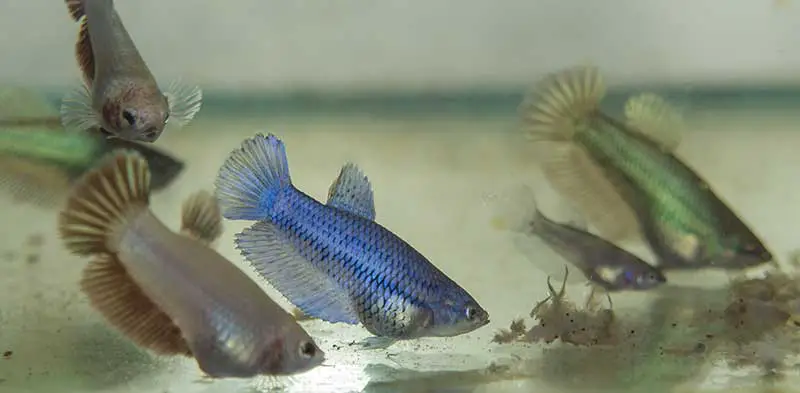
What To Feed Baby Betta At 3 to 4 Weeks
At 3 to 4 weeks, you can introduce some larger foods, such as bloodworms full of growth-promoting nutrients. You don’t need to use live food, as finely grated frozen food will suffice. You can continue feeding baby brine shrimp at this stage.
What To Feed Baby Betta At 5 to 6 Weeks
At 5 to 6 weeks old, your baby betta will benefit from further variety in their diet. Again, it would help if you stick to live or frozen food and consider introducing many different types of aquatic worms, such as grindal worms and blackworms.
You can introduce aquatic worms to the tank in more significant numbers, which the betta fry will feed off as and when required.
Continue feeding with the baby brine shrimp.
What To Feed Baby Betta At 8 to 9 Weeks
At 8 to 9 weeks, your betta fry will have matured to the point that they can now eat dry betta pellets. Ensure you use a quality brand containing all the required nutrients for good health.
When introducing betta pellets, I suggest grating them into a fine powder to begin with, or at the very least, crumbling them between your fingers.
Dry pellets need an opportunity to absorb some water before they are eaten because they will expand. If eaten dry, the pellets will expand inside the betta’s stomach, causing bloat and possibly leading to constipation.
At 8 to 9 weeks, you should also feel confident enough to try food that you would feed to adult bettas. A young betta’s digestive system should now be mature enough to manage a wider variety of food types but introduce them slowly to avoid upset stomachs.
Some other foods to consider are:
- Tubifex Worms
- White Worms
- Mosquito Larvae
- Vinegar Eels
- Daphnia
The general rule of thumb is to feed your fry whatever size food they can manage to eat.
It is essential to feed your fry with live foods. Not only do they contain the highest number of nutrients, but your fry will also instinctively eat live food over frozen or freeze-dried food.
I should mention that despite the high nutritional value of live foods, they are also more likely to carry parasites and bacteria, which can harm young fish, so you will need to source good quality food or grow your own.
Tubifex Worms and White Worms are common carriers of harmful parasites, so if you are ever unsure, it would be advisable to freeze them before feeding them to infant betta fish.
All of the above foods can be sourced from local pet stores, and most pet stores have an online presence providing mail orders and speedy delivery. If you have a pet store nearby, it’s the perfect opportunity to see what you are buying, and you can ask questions directly.
Recommended Suppliers
I used to limit my betta food purchases to local pet stores until I found there’s a wide variety of live, frozen, and freeze-dried foods available to purchase online. If you haven’t already, I would highly recommend checking out the links below for Chewy and Amazon.
How Often Do You Feed Baby Bettas
You should feed your baby betta small meals frequently throughout the day. 4 or 5 feeds are expected during the growing stage, but ensure you only provide them as much as they can eat. Uneaten food will begin to rot, quickly upsetting the water quality in the tank.
As the baby fish begin to mature, they will eat larger amounts at each feed and require fewer meals throughout the day.
I mentioned previously that some breeders allow small aquatic worms to live within the tank, and this is a good way for the young betta to source their food when hungry, and it will teach them to hunt out food as they would in their natural habitat.
Conclusion
Bringing up baby betta fish can be very rewarding, and by following the guidance in this article, your betta fry should grow quickly and be in good health.
It is common to lose some of your betta fry, especially in the first few days, but you should manage to retain at least 80-90 percent of them.
If you consider breeding your betta, they will mate often, which could be pretty overwhelming or something you take well to.
If you become good at breeding your betta, have a go at crossbreeding for particular colorations and tail types. Many articles around the web can teach you what you would need to know.


